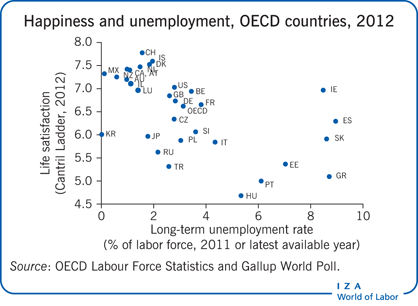Elevator pitch
Measures of individual happiness, or well-being, can guide labor market policies. Individual unemployment, as well as the rate of unemployment in society, have a negative effect on happiness. In contrast, employment protection and unemployment benefits can contribute to happiness—though when such policies prolong unemployment, the net effect on national happiness is negative. Active labor market policies that create more job opportunities increase happiness, which in turn increases productivity. Measures of individual happiness should therefore guide labor market policy more explicitly.

Key findings
Pros
Unemployment has a significant negative effect on individual happiness and is comparable to personal trauma such as divorce or a death in the family.
Employment protection policy for permanent jobs contributes to happiness.
Unemployment benefits contribute to happiness.
Policies designed to increase employment opportunities also increase happiness.
Policies aimed at reducing income inequality, such as minimum wages, will increase happiness.
Cons
The pain and subsequent unhappiness of losing a job is not fully compensated for by finding another job, unless this occurs seamlessly.
Employment protection can increase unemployment for “outsiders” and hence be associated with unhappiness.
Favorable unemployment benefits may prolong the period of unemployment and thereby reduce happiness.
Minimum wages may reduce happiness if they lead to more unemployment.
Happiness-increasing policies have winners and losers, so there is risk to governments in introducing happiness-increasing policies.